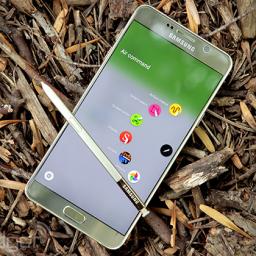
It's hard not to look at one of Samsung's flagship phablets without feeling a pang of nostalgia for Palm's products back in the day, stylus and graffiti handwriting recognition and all. Samsung bucked the trend as Steve Jobs defiantly maintained, "if your device has a stylus, you have failed." Instead, Samsung's Note line of devices use an integrated, touch-sensitive stylus to permit new applications and unlock new ways of interacting with software.
The Note is in its 5th incarnation in 2016.
Engadget has taken a look at it and finds it pretty compelling overall, despite changes that will turn off many: no microSD support, no swappable battery, a wimpy single speaker, and only 32GB and 64GB options.
Let's cut to the chase: This is the most attractive, most comfortable-feeling Galaxy Note that Samsung has ever made. ... The generous curve of the backplate and the trimmed-down bezels surrounding the 5.7-inch, Quad HD, Super AMOLED screen make the Note 5 much easier to hold than any of the previous-gen Notes, ... More importantly, the screen is an absolute champ under the sweltering summer sun. With brightness cranked up all the way, I had no trouble ... If you've fiddled with a Galaxy S6, you know exactly what to expect here. The Note 5 comes with a TouchWiz-ified version of Android 5.1.1, and once again, I appreciate the lighter touch Samsung has been taking with its software. It's not my favorite skin and I still think it pales in comparison to the stock Google Now Launcher, but I'm pleasantly surprised by how much less obnoxious TouchWiz is these days. All of Samsung's mainstay features are here, and they all work as well as you'd expect them to.
Other reviews are similar. Check them out at
Gizmodo and
Tech Times.
Forbes has discovered you can screw up your device by sticking the stylus in its receptacle the wrong way. So, don't do that then, dummy.
With the rise of mobile computing came a swell of frustration by people who preferred their fancy, personal devices to the locked-down devices (if any) provided for them at work. Eventually, corporations relented, opening the door to a plethora of "bring your own device" policies that IT staff detest owing to increased security risk and the unacceptable co-mingling of personal and private data.
We've been working in this environment for a few years now, and increasingly, tech directors are willing to speak out about this model's deficiencies. But users aren't unanimously happy with the compromises made either. One small example:
In an interesting test case in California, a worker is reported to be suing her former employer for invasion of privacy and wrongful termination of employment.
The person claimed they were sacked after deleting an app (Xora iPhone app) from her company-issued handset that she believed allowed her employer to spy on her. She claims the app tracked where she was - using the device GPS - including how fast she was driving, even when she wasn't working.
The Register takes a look at the pros and cons of what has become a pre-selection of pre-approved devices, i.e. "CYOD" or "choose your own device."
What about |.ers? Are you bringing your own device, or saddled with the corporate choice, or avoiding pocket computing all together? Which model worked the best for you?

Based on anonymized data collected from users of an app designed to check for a newly revealed vulnerability in many Android devices, Check Point has discovered that
at least one application currently in the Google Play store is exploiting the vulnerability to gain root access to the Android OS - and bypassing Google's security scans of Play applications to do so.
While the app was discovered installed on an infinitesimal percentage of devices checked by Check Point, it shows that the vulnerability caused by insecure OEM and cell carrier software meant to provide remote access to devices for customer service engineers has already been exploited by "legitimate" phone applications-and the method used to bypass Google's security checks could be used for more malicious purposes on millions of devices. And there's no easy way for Google or phone manufacturers alone to patch the problem.
At the Black Hat security conference in Las Vegas earlier this month, Check Point's Ohad Bobrov and Avi Bashan presented research into an Android vulnerability introduced by software installed by phone manufacturers and cellular carriers that could affect millions of devices. Labeled by Bobrov and Bashan as "Certifi-Gate," the vulnerability is caused by insecure versions of remote administration tools installed by the manufacturers and carriers to provide remote customer service-including versions of TeamViewer, CommuniTake Remote Care, and MobileSupport by Rsupport. These carry certificates that give them complete access to the Android operating system and device hardware. The applications are commonly pre-installed on Samsung, LG, and HTC handsets.

Scientists' understanding of the El Nino phenomenon - in which a reversal of warm and cool currents in the Pacific Ocean brings wet weather to America's West Coast and elsewhere while areas used to monsoon rainfall remain dry - is better than ever. But that hasn't helped our ability to accurately predict El Nino years, and of course even prediction does nothing for mitigating the sometimes disastrous effects.
El Nino-watchers at America's National Oceanic and Atmospheric Administration (NOAA) noted worrisome ENSO-related changes in both sea temperature and air pressure earlier this year. They declared the return of the Boy in March. Australia's Bureau of Meteorology decided to wait until May. Such forecasts can be wrong. Despite signs of the phenomenon last year, no monstrous event actually emerged. But during July the surface temperature of the central equatorial Pacific was almost 1C higher than expected, and its equivalent in the eastern Pacific was more than 2C above expectations. Among other things, that puts the temperatures in these areas well above the 26.5C minimum needed for the formation of tropical storms. Right on cue, on July 12th, six such cyclones spun in the Pacific-more than on any previous day in over four decades.
Mike Halpert, the deputy director of NOAA's Climate Prediction Centre, believes the current Nino could be among the strongest since records began in 1950. That one was responsible for 21,000 deaths and $36B in damages on houses, bridges, and culverts.
Time to get out the raincoats and umbrellas?
Adobe's Flash has earned a reputation for insecurity through a litany of vulnerabilities through the years since its inception in the late 1990s. But it hasn't made many friends among users, either, who are increasingly either turned off by bandwidth-sucking video advertisements, or are nervous that running Flash adverts leaves your machine open to all sorts of vulnerabilities.
Amazon.com is now coming around to that point of view as well. Since so many users either block or are fearful of flash adverts, the marketing juggernaut has decided to henceforth refuse to use them. Amazon is only one of many Internet sites, but it's a high profile one, and their refusal of Flash adverts may finally tip the market in a direction it should've headed long ago. Could this be the end of Adobe Flash?
Smartwatches are here, but are they here to stay? Given short battery life and - for the moment, limited use cases - Google, Apple, and the others are in a race to build or have built apps that make your smartwatch a must-have item.
Google's latest innovation for Androidwear is
interactive watch faces and translation apps. The interactive watch face is a direct assault on Apple, who has not permitted similar functionality for its Apple Watch. Tap, and the watch reveals more information like weather, fitness, to unread mail, to upcoming meetings and so on. There's obviously room for improvement here, but allowing it to happen at all is a step in the right direction. The folks at Google have indicated there are more than 1,500
watch faces currently available.
Their second innovation is putting a built in Google translate on their smartwatch. RTOZ reports:
just speak into your watch to see your conversation translated into any of 44 languages. Flip your wrist to show the translation to a friend. When they respond in their own language, flip your wrist back, and you'll see in your language what they've just said.
Google Translate will automatically recognize which of the two languages is being spoken, so once you tap to start the conversation, all you and your buddy need to do is keep talking naturally.
Google Translate covers 90 languages total (for text translation), and also Google is working on to expand more number of languages that work across various features.
A recent discovery by UCLA researchers might make a big difference to people who suffer strokes. In the treatment of stroke patients,
time really is brain: A few minutes can mean the difference between patients living independently or suffering debilitating disabilities.
The new device is a
new-generation stent clot retrieval device that aids in the removal of clots responsible for blocking blood supply to the brain. Faster removal of clots results in greatly improved medical outcomes for patients, as even a five-minute delay can negatively affect patients' chances.
The one-year study found that when blood flow was restored to the brain within four hours of the start of a stroke,
80 percent of patients had a very good outcome - meaning that they survived and were able to live independently three months later. The researchers also found that the odds of a poorer outcome increased by one percent for every five minutes that passed between the onset of a stroke and the time when doctors reopened the blocked artery.
Mozilla has been rethinking its add-on architecture for browser extensions, and has just made an announcement that may have profound implications for developers and browser users everywhere:
"Mozilla today announced major changes to how Firefox will implement add-ons going forward. The most important of these is the adoption of a new extension API that will be largely compatible with the one currently in use by Blink-based browsers like Chrome and Opera. This so-called WebExtensions API will ensure that developers will only have to make a few small changes to their code for their add-on to run on Firefox.http://techcrunch.com/2015/08/21/chrome-extensions-are-coming-to-firefox/http://www.thetimesgazette.com/mozilla-on-track-to-modernize-firefox-add-on-systems-and-extension-leaves-developers-unhappy/6502/https://wiki.mozilla.org/WebExtensions"We would like add-on development to be more like Web development: the same code should run in multiple browsers according to behavior set by standards, with comprehensive documentation available from multiple vendors,"Mozilla's Kev Needham writes in today's announcement. "Not everyone is happy about it. The developer of the popular
DownThemAll browser extension has proclaimed this move to be the end of his extension, and potentially many others. He says,
Gone with DownThemAll! will be add-ons that e.g. let you change major bits about the Firefox user interface (e.g. tabs tree add-ons), add-ons that allow you to do more "advanced" stuff than just showing or slightly altering websites, such as e.g. restarting the browser upon click (unless mozilla kindly provides an API for that, which won't be compatible with Chrome, of course). Add-ons like NoScript will be severely limited in their feature set as well. Say byebye to Greasemonkey and hello to Tampermonkey, with it's limitations. Want that add-on that lets you change the new tab page for something else or enhances that page? Maybe it will be available, maybe not, depending on if and when mozilla kindly provides WebExtensions APIs for such things. And of course, depending on if there will be an author creating this entirely new add-on from scratch.
What this also means: Almost all your existing add-ons will be broken, entirely, save for some Add-on SDK add-ons, namely those that don't do anything fancy. Sure, even today, lots of add-ons break, and some add-ons will not get updated when they do and there are no suitable replacements. However, with this change, almost every add-on will be completely broken and in need of major updating by the extension authors. Good luck with that.
Tor has its advocates, and it's certainly our best chance at ensuring a modicum of privacy online. But it's got vulnerabilities of its own.
One attack vector is through secure BIOS systems that can be rooted and then have access to everything a computer does, regardless of operating system.
Kallenberg and Kovah have created a tool that automates the identification and exploitation of BIOS bugs, a number of which they will detail at CanSecWest. Using their own bespoke malware, they have repeatedly been able to gain access to System Management Mode (SMM), a part of the computer used by firmware that's entirely separate from other processes, but can read everything going through a machine's memory.
"Once the payload is delivered, we have an agent running in SMM," said Kallenberg during a demo session with FORBES. "The thing about SMM is that it runs independent of the operating system, the operating system has no visibility into system management mode, it's a protected region that can't be read or written by the OS - Tails can't read or write to it - but it has access to all of memory."
Check out the rest at
'Voodoo' Hackers: Stealing Secrets From Snowden's Favorite OS Is Easier Than You'd Think.
Our Monday poll is essentially a blatant pitch by zafiro17 for site feedback. I personally bounce among several sites for my tech news but always find myself back at Pipedot, and that got me thinking about what I like about the site that keeps me coming back for more. In this Borda poll you'll find choices related to the subject matter and the community, but also a small subset of some of the technical innovations that make Pipedot unique. Rank your choices from 1 (the strongest reason I like the site) and continue downward, assigning 2 to your second strongest preference, and so on.
For a list of some of Pipedot's features, check out the
Pipedot category of this site: there are possibly some you haven't discovered yet. If I've forgotten anything, tell us about it in the comments.
 It's hard not to look at one of Samsung's flagship phablets without feeling a pang of nostalgia for Palm's products back in the day, stylus and graffiti handwriting recognition and all. Samsung bucked the trend as Steve Jobs defiantly maintained, "if your device has a stylus, you have failed." Instead, Samsung's Note line of devices use an integrated, touch-sensitive stylus to permit new applications and unlock new ways of interacting with software.
It's hard not to look at one of Samsung's flagship phablets without feeling a pang of nostalgia for Palm's products back in the day, stylus and graffiti handwriting recognition and all. Samsung bucked the trend as Steve Jobs defiantly maintained, "if your device has a stylus, you have failed." Instead, Samsung's Note line of devices use an integrated, touch-sensitive stylus to permit new applications and unlock new ways of interacting with software.
